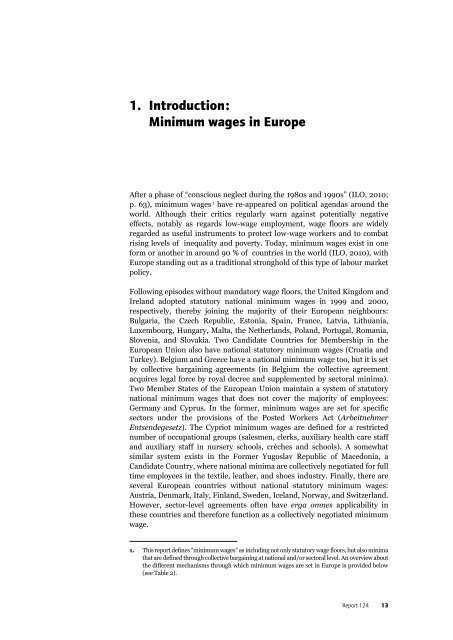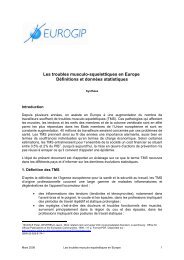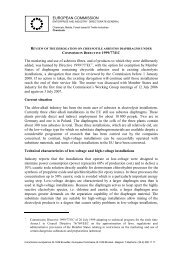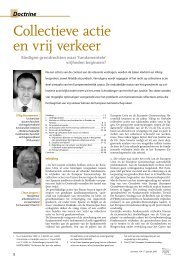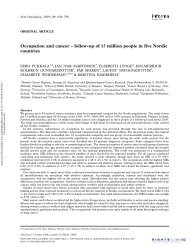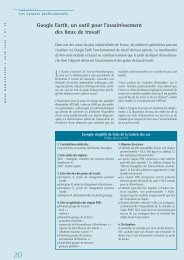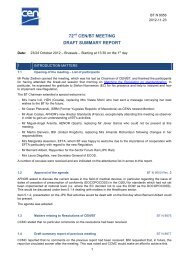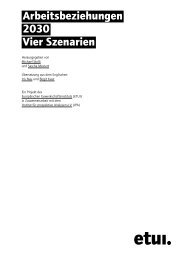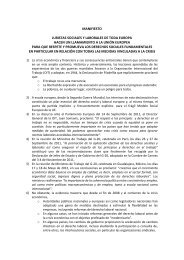Who earns minimum wages in Europe - European Trade Union ...
Who earns minimum wages in Europe - European Trade Union ...
Who earns minimum wages in Europe - European Trade Union ...
You also want an ePaper? Increase the reach of your titles
YUMPU automatically turns print PDFs into web optimized ePapers that Google loves.
1. Introduction:<br />
M<strong>in</strong>imum <strong>wages</strong> <strong>in</strong> <strong>Europe</strong><br />
After a phase of “conscious neglect dur<strong>in</strong>g the 1980s and 1990s” (ILO, 2010;<br />
p. 63), <strong>m<strong>in</strong>imum</strong> <strong>wages</strong> 1 have re-appeared on political agendas around the<br />
world. Although their critics regularly warn aga<strong>in</strong>st potentially negative<br />
effects, notably as regards low-wage employment, wage floors are widely<br />
regarded as useful <strong>in</strong>struments to protect low-wage workers and to combat<br />
ris<strong>in</strong>g levels of <strong>in</strong>equality and poverty. Today, <strong>m<strong>in</strong>imum</strong> <strong>wages</strong> exist <strong>in</strong> one<br />
form or another <strong>in</strong> around 90 % of countries <strong>in</strong> the world (ILO, 2010), with<br />
<strong>Europe</strong> stand<strong>in</strong>g out as a traditional stronghold of this type of labour market<br />
policy.<br />
Follow<strong>in</strong>g episodes without mandatory wage floors, the United K<strong>in</strong>gdom and<br />
Ireland adopted statutory national <strong>m<strong>in</strong>imum</strong> <strong>wages</strong> <strong>in</strong> 1999 and 2000,<br />
respectively, thereby jo<strong>in</strong><strong>in</strong>g the majority of their <strong>Europe</strong>an neighbours:<br />
Bulgaria, the Czech Republic, Estonia, Spa<strong>in</strong>, France, Latvia, Lithuania,<br />
Luxembourg, Hungary, Malta, the Netherlands, Poland, Portugal, Romania,<br />
Slovenia, and Slovakia. Two Candidate Countries for Membership <strong>in</strong> the<br />
<strong>Europe</strong>an <strong>Union</strong> also have national statutory <strong>m<strong>in</strong>imum</strong> <strong>wages</strong> (Croatia and<br />
Turkey). Belgium and Greece have a national <strong>m<strong>in</strong>imum</strong> wage too, but it is set<br />
by collective barga<strong>in</strong><strong>in</strong>g agreements (<strong>in</strong> Belgium the collective agreement<br />
acquires legal force by royal decree and supplemented by sectoral m<strong>in</strong>ima).<br />
Two Member States of the <strong>Europe</strong>an <strong>Union</strong> ma<strong>in</strong>ta<strong>in</strong> a system of statutory<br />
national <strong>m<strong>in</strong>imum</strong> <strong>wages</strong> that does not cover the majority of employees:<br />
Germany and Cyprus. In the former, <strong>m<strong>in</strong>imum</strong> <strong>wages</strong> are set for specific<br />
sectors under the provisions of the Posted Workers Act (Arbeitnehmer<br />
Entsendegesetz). The Cypriot <strong>m<strong>in</strong>imum</strong> <strong>wages</strong> are def<strong>in</strong>ed for a restricted<br />
number of occupational groups (salesmen, clerks, auxiliary health care staff<br />
and auxiliary staff <strong>in</strong> nursery schools, crèches and schools). A somewhat<br />
similar system exists <strong>in</strong> the Former Yugoslav Republic of Macedonia, a<br />
Candidate Country, where national m<strong>in</strong>ima are collectively negotiated for full<br />
time employees <strong>in</strong> the textile, leather, and shoes <strong>in</strong>dustry. F<strong>in</strong>ally, there are<br />
several <strong>Europe</strong>an countries without national statutory <strong>m<strong>in</strong>imum</strong> <strong>wages</strong>:<br />
Austria, Denmark, Italy, F<strong>in</strong>land, Sweden, Iceland, Norway, and Switzerland.<br />
However, sector-level agreements often have erga omnes applicability <strong>in</strong><br />
these countries and therefore function as a collectively negotiated <strong>m<strong>in</strong>imum</strong><br />
wage.<br />
1. This report def<strong>in</strong>es "<strong>m<strong>in</strong>imum</strong> <strong>wages</strong>" as <strong>in</strong>clud<strong>in</strong>g not only statutory wage floors, but also m<strong>in</strong>ima<br />
that are def<strong>in</strong>ed through collective barga<strong>in</strong><strong>in</strong>g at national and/or sectoral level. An overview about<br />
the different mechanisms through which <strong>m<strong>in</strong>imum</strong> <strong>wages</strong> are set <strong>in</strong> <strong>Europe</strong> is provided below<br />
(see Table 2).<br />
Report 124<br />
13


